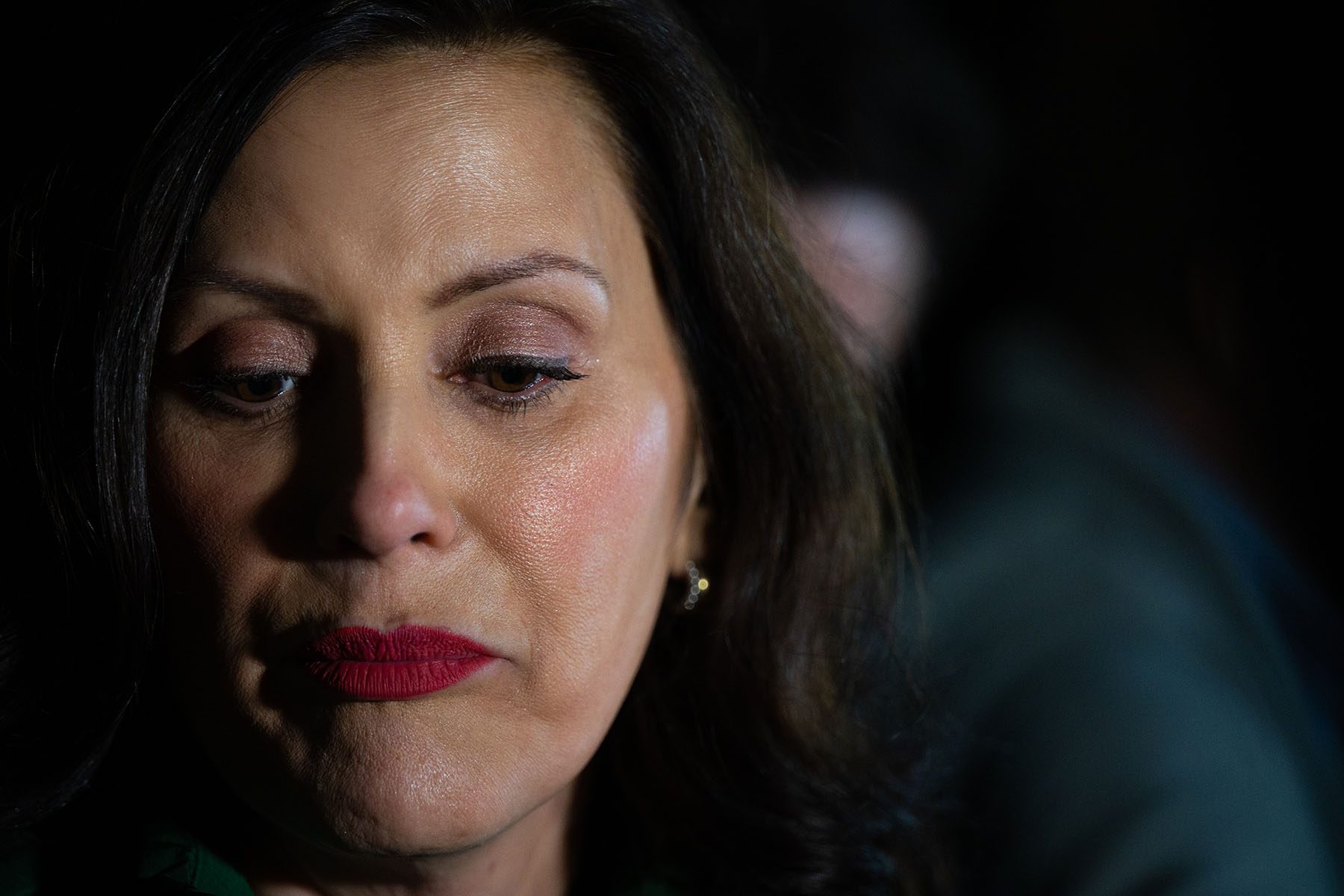Your trusted source for contextualizing politics news. Subscribe to our daily newsletter.
A man was arrested last week and accused of posting numerous threats on YouTube, targeting Michigan Gov. Gretchen Whitmer, as well as FBI agents, President Joe Biden and members of the LGBTQ+ community.
The previous week, another man was arrested, accused of tweeting threats against Jewish Michigan officials. One was Attorney General Dana Nessel, she confirmed.
Women hold the majority of leadership posts in state government and the legislature in Michigan, and the state has been a hotbed for threats of political violence. Whitmer, a Democrat who was overwhelmingly reelected in November, was the target of a kidnapping plot shortly before the 2020 presidential election. Earlier that year, Nessel and Whitmer were the target of a separate threat online.
Experts on political violence say women, and particularly women of color, are disproportionately impacted by threats of harassment and political violence. Some recent incidents have been linked to election denialism, and others to white supremacist movements, which object to women, people of color and people who are not Christian in public life. What this means for the long-term effects on representative democracy is still unclear, but growing data highlights worrying trends.
Public officials who identify as women or racial or ethnic minorities are more likely to report being insulted, harassed or threatened, according to a survey released in December by the Bridging Divides Initiative, a nonpartisan research effort based out of Princeton University that tracks and mitigates political violence in the United States, and nonprofit group CivicPulse.
“Where we feel like we’re at in the country is really this elevated and more permissive environment overall” for political violence, said Shannon Hiller, executive director of the initiative. “That can be just as bad, so we don’t necessarily need to see violence to be increasing at a steady rate to be really concerned about the overall dynamics.”
Researchers have been conducting follow-up interviews with some municipal officials who said they had been threatened or harassed in the last three months.
“Women in particular are saying that they have a lot of support to run for office, but once they’re in office, they don’t have as much support,” Hiller said. “So when you add on top of that this climate of harassment, it makes it really hard for folks to make the decision to stay in office.”
Earlier this year, Solomon Peña, a Republican who unsuccessfully ran for a seat in the New Mexico legislature during the midterms, was arrested in connection with a series of drive-by shootings at the homes of Democratic officials in the Albuquerque area.
No one was injured in the shootings, though a state senator whose home was targeted said bullets went through her 10-year-old daughter’s bedroom. In January, Linda Lopez told the Santa Fe New Mexican that while she wants to run for another term, the experience means she’ll have conversations with her family about it.

“Is it worth me putting my family at risk because I vote a certain way, I espouse certain ideals?” she said.
Peña pleaded not guilty following an indictment on 14 charges. A trial is scheduled to begin next January.
Peña refused to concede his own race. He has publicly supported former President Donald Trump and claimed on social media that he attended a January 6, 2021, rally in Washington, D.C., before the Capitol insurrection. Trump has used violent rhetoric, from his 2016 campaign in which he egged on supporters against protesters and the press, to January 6, to now, when he has promoted messages that embrace violence.
“The New Mexico example illustrates how quickly it can go from someone aggrieved because of election disinformation or denialism … to someone acting on the way in which they are aggrieved,” said Katie Reisner, senior counsel for States United Democracy Center, a nonpartisan organization that advocates for free, fair and secure elections.
Reisner said Americans must not become numb to the reported incidents of violence, including close calls that are deemed threats.
“The enduring issue is that we live in a society that still has too much tolerance and too much normalization of kind of a base level of political violence for a healthy democracy,” she said.
When Biden gave his State of the Union address in January, he briefly turned his attention to political violence. He tied the 2021 violence at the Capitol to the attack last October on Paul Pelosi, the husband of former House Speaker Nancy Pelosi. The former speaker was not present during the attack, but investigators believe she was an intended target.
“There’s no place for political violence in America,” Biden said. “We have to protect the right to vote, not suppress that fundamental right — honor the results of our elections, not subvert the will of the people. We must uphold the rule of law and restore trust in our institutions of democracy. And we must give hate and extremism in any form no safe harbor.”
Experts on representation and threats emphasized that even when threats do not turn into violence, they can still affect who feels comfortable fully participating in democracy.

Reisner said threats or harassment can count toward instances of political violence if they have an effect on who votes, runs for elected office or uses their voice to express themselves. That has a disproportionate impact on women, people of color and people from other marginalized communities.
“It’s really acts that are intended in changing who benefits from, who participates in, broader society and democratic institutions,” she said.
Hiller added: “Sometimes threats are enough. People don’t have to commit direct violence for there to be a real chilling environment on civic participation and these essential parts of our democracy.”
How policymakers, law enforcement and the public respond to threats of political violence is important.
“Research shows that when political leaders themselves condemn political violence, that has a deterrent effect … no one thing is going to be the thing that prevents it, but I think it’s just important to use these as opportunities to look for, ‘What could we have done better?’” Reisner said.
Following the New Mexico attacks, Republican leaders in the legislature condemned the shootings. Senate Republicans in Michigan issued a statement on the latest arrest involving a threat to Whitmer. Senate Republican Leader Aric Nesbitt said violent extremism “has no place in our political discourse.”
“Despite our political and social differences, we cannot lose respect for the dignity of our fellow citizens. We all must share in the important mission of working together for the greater common good,” he said.
According to the Department of Justice, the threats against the Michigan officials were detailed and explicit.
Randall Robert Berka II of Sebewaing, Michigan, is accused of making numerous threats against Whitmer and other officials and was charged with illegally possessing firearms and ammunition. Berka’s alleged statements include “im gonna kill lgbt freaks and “you could be like me and get guns and threaten to kill politicians. Im more than willing tot kill whitmer and I do live in Michigan.”
Jack Eugene Carpenter III, of Tipton, Michigan, has been accused of threatening Jewish government officials in the state. “I’m heading back to Michigan now threatening to carry out the punishment of death to anyone that is jewish in the Michigan govt if they don’t leave, or confess,” he tweeted, according to the Department of Justice.
Policy action may also play a role in addressing political violence. Several states have proposed protections for election workers, a women-led workforce that has faced a rise in threats of violence. Some workers have resigned in the face of harassment.
In New Mexico, lawmakers this session have proposed legislation that would remove some elected officials’ home addresses from government websites. It’s part of a package of bills that also include protections for election workers.
Whitmer, who is seen as a rising political star, told CNN’s Chris Wallace this month that she considers the 2020 plot against her an assassination attempt. In December, one of the men was sentenced to more than 19 years in prison. Another was sentenced that month to 16 years in prison.
Whitmer said she thinks about safety when she’s out in public.
“I’ve got the greatest state police detail in the world. But there are big crowds at times and it does cross my mind,” she told Wallace. “I’m not obsessed with it. But it does cross my mind.”
Whitmer added that the threats will not “scare” her or how she governs.
“I’ve got a job to do and I’m gonna do it,” she said.






